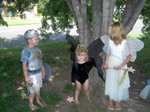
Do you remember in September I had a Bone to Pick about the use of the word "troops"? Well, I receive a newsletter from ArcaMax Publishing called "ArcaMax Vocabulary" containing a word with definition and usage or an article written by the WordGuy, Rob Kyff, so I wrote to Rob with my Bone to Pick. With Rob's permission, here is that correspondence...
Rob,
I have been receiving your articles via ArcaMax for a while now and have enjoyed refreshing what I have learned and adding to my knowledge base. What I would like to to know is when "troops" came to mean a single soldier. Seems to me that I began to hear it defined this way after 9/11. All the dictionaries that I have looked at say that the word "troop" means a group, "trooper" is an individual. So what is right?
Hi -
Here's something I wrote about this a few years ago . . .
Rob
by Rob Kyff
“US Troop Injured in Firefight” When Arthur Johnson of Potsdam, N.Y., read that headline, he snapped to attention. “I read on,” he writes, “expecting to find that about 200 men had been wounded. But no, it was only one soldier, not a whole troop . . . When did 'troop' become a word for a single soldier?” It didn't, but the confusion over the use of “troop” and “troops” resembles the chaos of battle. “Troop” originally referred to a unit of cavalry and, later, to a company of infantry or a battery of artillery. So people spoke, for example, of a “troop of cavalry” (as in the old TV show “F Troop”) or, when referring to several such units, “troops of infantry.”
So far, so good.
But soon people started using “troops” as a general term for a large number of individual soldiers, especially when members of different branches of the military were involved. So “10,000 troops landed on the beach” came to refer, not to 10,000 groups, but to 10,000 individuals. That's why phrases such as “2,000 troops” and “1,000 troops” are generally understood to mean 2,000 and 1,000 individuals, respectively.
But what happens when “troops” refers to smaller numbers? Phrases such as “500 troops” or even “50 troops” seem clear enough, but any number below 10 (“six troops”) sounds strange. And anyone using “troop” to refer to a single person, as in “US Troop Injured in Firefight,” should be court-martialed.
What to do?
I'd follow what I call the “10 stout-hearted-men” rule. Don't use “troops” for any number below 10. Instead, say “nine soldiers,” “five sailors,” “one Marine” - whatever applies.
And speaking of “troop,” many readers have asked me about the term for someone who gamely persists through difficulties. Is such a person “a real trooper” or “a real trouper”? Because this phrase originally referred to a member of a traveling acting troupe who endured the travails of the theatrical circuit - The show must go on! - the correct spelling is “trouper.” But, because military or police “troopers” also endure hardships without complaint, people sometimes render this expression as “a real trooper.” Be a real trouper and resist this temptation.
Thank You, Rob! Now who do I need to send this on to?













1 comment:
Send it to every media source in America... lol They all use it wrong...
Post a Comment